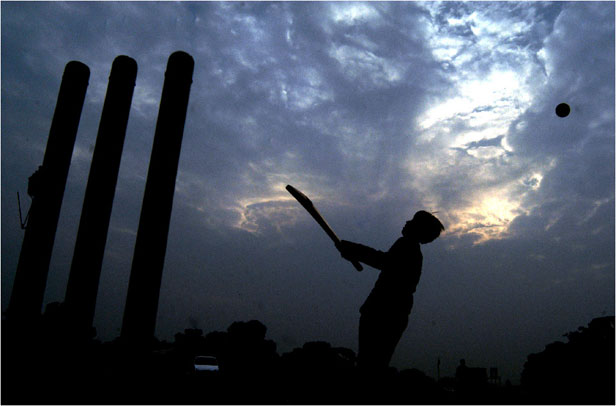SOURCE: Tata Tea
Alarm Bajne Se Pehle, Jaago Re
Thanks to academic pressure, fears of an unpredictable career, or simply the lack of social encouragement, when it comes to pursuing their passion for sports, India's youngsters are rarely left with much of a choice.

Karthik Subramanium*, a 16-year-old student based out of Mumbai recently sold his top-notch tennis racquet on OLX. Playing since the age of 6, Karthik had won over 20 medals at intra-school tournaments, apart from several honours at local competitions. In fact, his limited-edition Babolat Pure Aero racquet --- also preferred by world champion Rafael Nadal – had been specially ordered by his coach after a major tournament victory. Ten years after his first serve, however, Karthik's superior skills finally met their match—in his board exams.
"This is the time for academics."
Like several other budding athletes in India, Karthik's tennis dreams were rudely interrupted once this typically Indian rite-of-passage reared its head. His parents, while largely supportive of his 'hobby', put their foot down when it came to choosing between practice sessions and IIT-entrance classes. Karthik wasn't alone. In his peer group, as many as 10 promising athletes in different sports – from table tennis to football and gymnastics – had 'retired' way before they even had a chance to shine.
This is far more common than one might think. We place an undue amount of importance on academics in India—at the cost of sports and nearly everything else that a student might find interest in. During the ages of 14-17, this pressure is particularly immense with board examinations, entrance tests, and interviews round the corner. It doesn't matter how talented their child may be, Indian parents are, by nature, risk averse and prone to taking the 'safer' option. And when the choice is between an engineering career and being a professional gymnast, the decision is a no-brainer.

SOURCE: Hindustan times
"There is no future in sports."
Thanks to our national obsession with mark sheets and stable jobs, we are quick to denounce that a career in sports is neither intellectually superior nor rewarding. This mindset reflects a basic lack of respect for not just the skills and expertise athletes bring to their sport, but also the immense commitment required by any physical discipline. Most sports personalities who make it to the national or international stage often succeed on their own mettle. And yet, despite winning against such odds, what do they receive in terms of job security and appreciation?
In the 1962 National Games, Makhan Singh shocked onlookers by his record performance on the track, where he beat national favourite Milkha Singh. In the same year, he went on to win both gold and silver at the Asian Games. Despite an enviable track record, Singh eventually died in 2002 after a terrible truck accident where he lost his leg. Only a few people in his native village of Hoshiarpur know him as the Arjuna-Award winning athlete, whose several medals are presently collecting dust even as his wife struggles to save funds for house repair.
One will find similar parallels in the story of the 'Rock of Gibraltar', Shankar Lakshman, one of India's most fiery goal-keepers in hockey. The winner of two Olympic golds and one silver, Lakshman was the first-ever goalkeeper captain for India's international hockey team and a winner of the Padma Shri. Despite his achievements, Lakshman fell out of the limelight easily, living his last years in abject poverty.
"What happens when you're too old to play?"
A primary reason why parents discourage students from considering sports as a legitimate career option is its short shelf-life. Examples like Singh and Lakshman echo the Indian parent's worst fears: There is no guarantee to a sportsperson's life, especially in cases of injury, non-performance, or simply, age.
Unfortunately, these fears are not unfounded. The lack of efficient prioritisation and balance has ensured that most sportspersons do not continue their education beyond a point. As a result, falling back on a career at a later stage in their lives becomes quite an impossible task. Majority of them are left with basic government jobs that rarely pay the bills. The unluckier ones, such as sprinter Sarwan Singh or boxer Kamal Kumar Valmiki, are forced to earn their living through completely disparate professions — a taxi driver and a garbage collector respectively.
Is it any wonder then that Indian parents worry there's no future in sports?

SOURCE: Hindustan times
It's time to pre-act
There is no denying that sports is a high-risk career option; one that requires tremendous support not just from guardians and coaches, but also governments, medical experts, counsellors, and the media. With the exception of cricket, a majority of sports tournaments are not even telecast or written about. Very few waste precious column space on the actual troubles ailing Indian sports – and the glaring lack of a vibrant sporting culture in the nation. In case of non-performance, however, columnists are quick to churn out editorials lamenting the poor quality of sports talent in the country.
Medals, after all, aren't won overnight. No athlete or sportsperson can succeed beyond a point without the backing of their family and the support of their nations. Despite facing challenges in infrastructure, training, equipment, and opportunities, young sports stars are constantly struggling to excel and maintain their passion for their game. As parents and teachers, let's not nip this in the bud.
Instead, let's proactively work towards creating a strong and permanent culture of sports in the country. One major way we can do this is by building a sports-loving atmosphere at home, by encouraging children to participate in as many activities as they like. Additionally, it's important to develop an appreciation for all sports – not just cricket and football – and promote young talent wherever possible. Children should be able to look up to sports achievers as role models, and as parents and school teachers we can encourage this by highlighting underrated athletes and their contributions. Finally, young sportspersons shouldn't feel the pressure of choosing between their game and their academics – the correct amount of balance and prioritization can ensure that they never have to.
It's time to create a new generation of sporting heroes in India. Let's begin by promoting a culture of sports in our own homes.
Join Tata Tea Jaago Re's campaign and sign the petition to make sports education compulsory across all schools in India.
*Name changed on request.